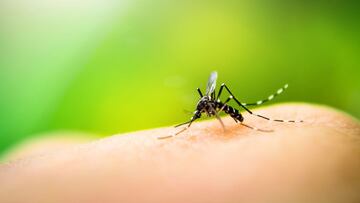Why do mosquitoes bite some people and not others?
With summer and mosquitoes season upon us, our team looked at the science available to answer one question: why do mosquitos bite some more than others?

Summer is back again, and the mosquitoes are, unfortunately, out to get us. But maybe not all of us equally.
How big a problem are mosquitoes in the US?
In 2021, the United States’ CDC confirmed a total of 2695 cases of West Nile virus disease in people have been reported to CDC. There were 191 deaths from that number. So, what about 2022?
Well, according to biologist and entomologist at Trent University, David Beresford, speaking to Today, “There are going to be lots of mosquitos in 2022 because of the increased rain and warmer weather that has given mosquitos an ideal breeding habitat.” Oh! As of the end of June, a total of only 10 cases of West Nile virus disease in people had been reported to the CDC, although we are only just entering the most dangerous of weeks.
Why do mosquitos seem to prefer some people more than others?
When in groups of people, you may find that you are bitten less than if you were to confront the pesky insect alone.
Of the more than 3,500 mosquito species, only 200 of them drink human blood. Studies done on this smaller subset are attacked to specific characteristics that can lead to receiving more or fewer bites.
Carbon dioxide and blood types
With their strong olfactory senses, mosquitos can often identify the best places on the body to bite, usually the feet and ankles.
Researchers at the London School of Hygiene and Tropical Medicine found that human body odor and various chemical compounds can lead to more bites.
There are two compounds our bodies naturally create which can attract mosquitoes: carbon dioxide and lactic acid. Adults tend to get bitten more frequently than children because they emit more carbon dioxide.
Later, researchers found that parasites can change the scent of a human host, making them more susceptible to mosquitoes bites. This is especially dangerous in areas where Malaria and other disease carried by mosquitos are present.
A study from the American Journal of Entomology found slight differences in the blood type preference of mosquitos. The study tracked 300 mosquitoes; 192 were confirmed to have bit a person. Thirty percent of the insects bit someone with Type O blood.
Results from the blood type study
| Blood Group | Number of Bites | Percent of Total Bites |
|---|---|---|
| A | 34 | 17% |
| AB | 48 | 25% |
| B | 37 | 19% |
| O | 59 | 30% |
| Multiple Bites | 14 | 7% |
Source: American Journal of Entomology
However, the reproduction levels of the insects, represented by the number of eggs laid, were the same across all blood types.
Other studies have demonstrated the black and red tend to attract mosquitos, whereas yellow and green have been shown to keep them at bay.





